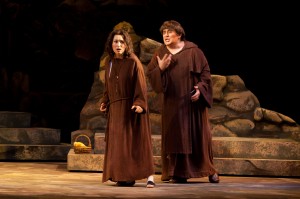The plot of La Forza del Destino is really very simple. Leonara and Don Alvaro are in love. Alvaro kills Leonora’s father and brother. He sends Leonora to her dying brother who kills her. Of course, there are some extenuating circumstances …
There is also a lot of beautiful music, starting with the overture and continuing through 8 scenes divided among 4 acts. I have noticed that one can frequently deduce something about an opera from the first three notes of the overture. In this case they are three clarion calls by the horns which tell me to sit up and take notice; this will be a strong tale with lots of action. And the next few notes in a minor key warn me that the tale will not be a happy one.
For a minute or two at the beginning, I wondered if I was witnessing a case of d�j� vu. Just a few hours before I attended West Bay Opera’s opening night of La Forza del Destino, I had participated in a play reading of G. B. Shaw’s Arms and the Man. The following words apply equally well to the opening scene of Shaw’s play and of Verdi’s opera:
“Her parent leaves and the heroine is alone in her bedroom at night. She picks up a portrait of her beloved and muses about how she loves him. A man enters her bedroom from the balcony – a shocking indiscretion for the culture of the time.”
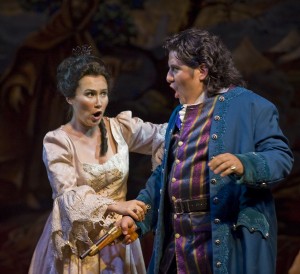
Don Alvaro (Percy Martinez) and Leonora (Olga Chernisheva) are planning to elope; photo by Steve DiBartolomeo
The similarity ends there, as the play goes on to become a witty comedy; with the opera the entering man is Don Alvaro (Percy Martinez), beloved of Leonora (Olga Chernisheva) and they are planning to elope, since her father the Marquis (Peter Graham) has absolutely forbidden her to have anything to do with Alvaro. They engage in the usual operatic shilly-shallying about how we-must-go-before-it’s-too-late but first we have to sing about how much in love we are until, of course, it is too late. The Marquis and his soldiers burst in. Alvaro pulls out his pistol to defend himself, but when the Marquis calls his daughter a whore and a slut (I don’t speak Italian and I don’t always trust supertitles, but I am sure from the action that those are the most polite synonyms for the words he actually used), Alvaro says with typical noble stupidity, “No, no. The fault is all mine. She is still pure and innocent. Do with me what you will.” He throws his pistol on the floor as a gesture of submission but it goes off on impact (you can’t trust these stage weapons one bit) and mortally wounds the Marquis. Extenuating circumstance #1. The two lovers exit rapidly pursued by the soldiers and the curtain falls on Act 1.

Scene at the country inn; far left: Trabuco, a muleteer and peddler (Daniel Galpin); center: gypsy and mayor; elevated near far right: Don Carlo; photo by Steve DiBartolomeo
Several months of story time elapse during 30 seconds of stage time before the curtain goes back up on a country inn where Leonora, disguised as a male, is a new arrival. Don Carlo di Vargas (Gabriel Manro) shows up, disguised as the student Pereda. Leonora sees him and hides, eavesdropping as Carlo asks about the newly arrived beardless youth staying there.
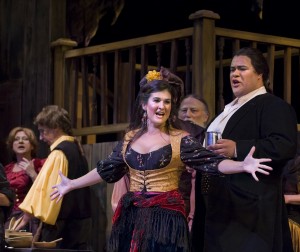
The Mayor (Carlos Aguilar) and Preziosilla the Gypsy (Michele Detwiler); photo by Steve DiBartolomeo
The Mayor (Carlos Aguilar) and Preziosilla, a young Gypsy (Michele Detwiler) give him little satisfaction, but we, the audience, learn a lot from his singing conversations. Carlo has become completely obsessed with “removing by blood” the “stain on his honor” caused by his sister for allowing herself to be seduced. His sole purpose in life is to kill Leonora and the “half-caste scoundrel” who seduced her and also killed his father. The two lovers had escaped the pursuit after the botched elopement, but had become separated and each believed the other to be dead. Carlo has gone back to his native Peru and he, Pereda, is trying to find Leonora on behalf of his “friend” Don Carlo.
Leonora is overjoyed to learn that Alvaro is still alive, but miserable because he has apparently abandoned her. She decides to live the rest of her life in utter solitude and sets off for a monastery which is near a cave where long ago another woman spent her life as a solitary hermit.
Several weeks later she gets to the monastery at 5 in the morning and rousts out a long-suffering but far from patient Fra Melitone (Carl King) and demands to see the Abbot immediately. Melitone is completely taken in by her disguise but insists several times that seeing the Abbot is impossible. She refuses to accept this, and eventually he accepts this fact and stumps off grumpily to fetch him.

Leonara is accepted into the Brotherhood as the Abbot, Padre Guardiano (Peter Graham) officiates; photo by Slava Mudry
Leonora reveals her disguise to the Abbot, Padre Guardiano (in an interesting irony of casting Peter Graham sings the roles of both her temporal and spiritual fathers). He is convinced of her sincerity and agrees to admit her (in disguise) to their brotherhood and install her in the cave where she will never again see a human being as long as she lives.
And we, the audience, finally get an intermission to stretch our legs, etc.

The action in Act III is fast and furious. Alvaro, it turns out, didn’t sail for Peru but joined the Spanish army under the name of Don Federico Herreros. He sings of his love for Leonora whom he believes dead. He hears a scuffle off stage and rushes off, only to return with another officer whom he has rescued from a gang of ruffians. And lo and behold, the rescued officer is Carlos soldiering under the name Don Felix Bornos. Only in operas and in novels by Dickens are we asked to believe in so many coincidences. But I can’t be bothered by coincidences because here comes my favorite favorite among all my favorite forms of Verdi music – the male duet. I really thrill to the beautiful blending of Martinez’ tenor and Manro’s baritone voices as they swear eternal friendship (in their disguised personae, of course).
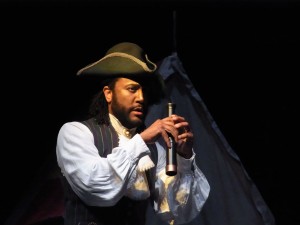
There is a call to battle and they rush off stage. Moments later the surgeon (Bradley Kynard), reports that Federico has fallen but that Felix has rescued him and they shortly reappear on stage. The surgeon indicates that the wound is probably fatal, whereupon the wounded man asks to be left alone with his friend. He gives him a key and asks him to take the wallet from his pocket and to vow that “after I die you will take a locked packet of letters from the wallet and burn them without opening them that my story may die with me.”
The surgeon and a couple of medics haul Federico off stage, leaving Carlos with the wallet. Something his new friend had said triggered a wild thought, “Could this be the scoundrel I am seeking?” For a minute he toys with the idea of opening the letters, but concludes that that would be dishonorable. But with a cry of “I didn’t swear anything about the other contents of the wallet” he dives in and comes up with a picture of Leonora. At the same time the surgeon returns to report: “Miracle! He will live!” Carlos gloats, “May you recover swiftly so that I may have the pleasure of killing you!”
Alvaro recovers completely. The two men meet for another great duet. Alvaro tries to make peace. Carlos will have none of it and his goading eventually results in a duel – which he loses. Alvaro, convinced that he has now killed both the father and the brother of the woman he loves, resolves to join a monastery before he can do any more damage.
Of course you know which monastery he picks, and 5 years later Carlos, who also had a miraculous recovery finds him. They sing their third musically wonderful duet, although the words are anything but harmonious: “Aha, you villain. I’ve found you at last. Here, grab this sword and defend yourself.” Alvaro lets the sword drop to the ground and sings “Peace, brother. I’m a monk. Monks don’t fight.”
Carlos calls him a coward and tries every verbal gambit he can think of, all to no avail. Finally he says, “OK, coward. You asked for it,” and gives him a resounding slap on the side of his face. This is too much even for Alvaro (didn’t these Christians ever hear Jesus’ admonition to “turn the other cheek?”). He grabs the sword but says, “not on these holy grounds” and they head for the woods.
The final scene is just outside the hermit’s cave. Leonora comes out through the barred entrance to the cave and sings another aria about how miserable she is, “Why can’t I die?” She hears noises of a fight off stage and retreats into her cave. Alvaro rushes on, “This time I’ve really killed him. I must find a priest to administer supreme unction.” He sees the cave entrance and shakes the gate. “The Hermit will have to do.” Leonora reluctantly appears and they are mutually astounded to recognize each other. But he says, “Explanations can wait. Your brother is dying over there and must make his last confession. It is your duty to hear it.”
She bows to his masculine authority and goes off, only to return a moment later, mortally wounded. It seems that instead of using his last breath for a confession, Carlos used it to run his sword through his sister’s body and thus die with the “stain on his honor” having been expunged.

Leonora dying in the arms of Alvaro; the Abbot blesses them both as Fra Melitone looks on; photo by Steve DiBartolomeo
The Abbot shows up with Fra Melitone and a couple of other monks. Leonora dies in Alvaro’s arms and goes to heaven; Carlos has presumably been assigned a different destination. At the urging of Leonora (before she died) and the Abbot, Alvaro kneels, asks the Lord for forgiveness, and believes he has been granted forgiveness. And I, in the audience, can believe in all this nonsense because it takes place to the most beautiful and sublime trio music of the entire opera. . . . . .
See, I told you the plot was simple. . . . . . .
I suddenly realize that I have written all these words about the opera and practically nothing about this performance – which was wonderful. I really admire the way WBO’s General Director, Jos� Luis Moscovich can put together such a polished performance of a difficult opera in these tough economic times and with the limited resources of a small opera company. The scenery and lighting were imaginative, the chorus was superb, the singing was good, and the acting was excellent.
For most of the opera Olga Chernisheva only had to show sadness, which she did very well, but in Act 1 her face switched instantly from: sadness when she thought of leaving her father; to joy when she flew into Alvaro’s arms; to indecision as she was torn between love for her father and for Alvaro.
I’ve already mentioned how the voices of Percy Martinez and Gabriel Manro fit together in their duets. Their acting was equally dramatic. The internal battle that Martinez fought as he tried to resist his natural impulse to react to violence with violence played off against the outstanding way that Manro’s every syllable, every expression, every gesture demonstrated his mono-mania. At times he was truly terrifying.
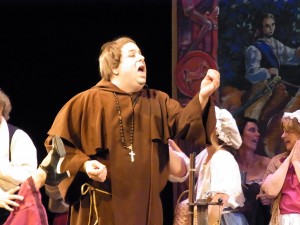
The minor characters all played their lesser roles to perfection. Peter Graham was suitably nasty as the bigoted Marquis and was superb as the wise and calm Abbot. Carl King’s grumbling and officious Melitone provided needed relief to the tension of the main story. Michele Detwiler’s sassy and sexy portrayal of the gypsy Preziosilla had me watching her whenever she was on stage.
And the good news is that the opera will be performed twice more this coming weekend. I’ve already seen it twice and I have tickets to see it again on Saturday, October 23. Come join me – or come to the final matinee the next day.
**********************************The_Opera_Nut*************************************
WEST BAY OPERA
Lucie Stern Theatre
221 Lambert Avenue
469 Bryant Street
Palo Alto CA”� 94306
650.424.9999
Photos by Steve DiBartolomeo, Slava Mudry, and Jos� Luis Moscovich.
This review by Philip G Hodge appeared in sanfranciscosplash.com on October 18, 2010.

